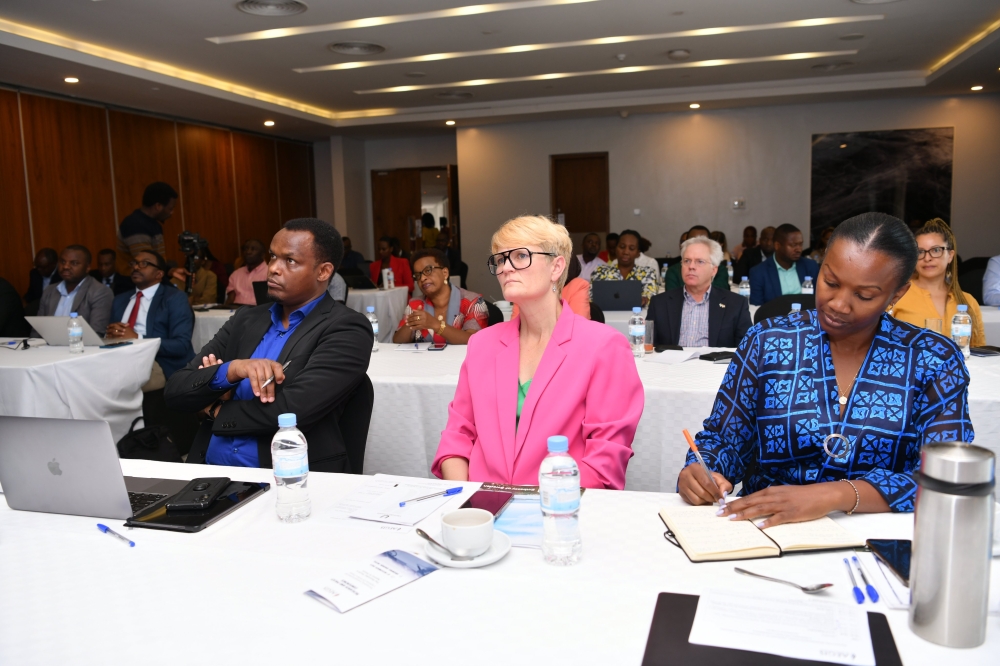

AEGIS Trust, an international non-governmental organisation that works to prevent genocide, crimes against humanity and mass atrocities worldwide, on December 7, concluded a one-day conference that unravelled the complexities surrounding Rwanda’s past and its impact on the youth today.
Under the theme "A Research for Policy Conference – Navigating Intergenerational Legacies of a Violent Past” with a focus on Rwandan youth, the primary aims were to link researchers to practitioners, including policymakers, facilitate the dissemination of produced work to potential users, and create a safe space for peacebuilding and intergenerational dialogues.
The conference took place, following a two-day workshop. The two events were part of a Aegis Research week.


By doing so, the conference sought to amplify the visibility of locally produced research, catalyse ongoing discussions, and deepen understanding of the youth’s pivotal role in addressing and navigating the shadows of a violent history of the past in shaping the future.
The gathering also featured keynote talks and research presentations by local scholars seeking to bridge the gap between policymakers and evidence-based insights from the field.
Exploring how the youth engage with the echoes of the 1994 Genocide against the Tutsi and entrenched traditional gender norms, the conference aimed to pave a path towards healing and progress.
ALSO READ: Aegis Trust to open two peace education centres
Claver Irakoze, Manager for Research, Documentation and Policy Engagement Department (RDPE) at Aegis Trust, said the conference was centred on intergenerational dynamics. "We are looking into different issues that young people are dealing with in post-Genocide Rwanda in line with the theme.
"The question is to examine what young people are inheriting from parents who experienced the violent past, including the Genocide and the persecution that preceded it. Also, how are young people identifying themselves in post-Genocide Rwanda and imagining their future?,” he said.
ALSO READ: Busingye lauds UK-based initiatives supporting Genocide survivors
Irakoze added: "Some of the research presented focused on translating and transforming intergenerational trauma, specifically on understanding the experiences and responses of Rwandan youth.
"Also presented was the reconciliation process in post-Genocide Rwanda. We are interested in examining the dialogue between young and old people as they work through issues related to inherited trauma, unhealed wounds, and life after the Genocide. Some of these young people live with the shame of coming from families of genocide perpetrators, while others live with parents who cannot speak out about the traumatic events.”
Irakoze acknowledged that there is intergenerational conflict between parents and children, arguing that the research presented highlighted behaviours that indicate various problems among the youth.
He said: "The prevalence of drug abuse among young people, family conflicts, a slight increase in suicide rates, depression, anxiety, and trauma all point to the suffering of the younger population in various ways.”
Communication breakdown between generations is a key issue contributing to the problem at hand, he added. "Many parents choose to remain silent, leading the younger generation to seek their own ways of coping with a past they did not personally experience.”
He mentioned that there is hope for young people to advance in research after realising that understanding their origin is crucial for success in life. He also noted the importance of policy makers and practitioners implementing highlighted findings.
ALSO READ: Govt looks to increase youth friendly centres
Providence Mbabazi, an emerging researcher at Ndabaga Impact, said some young people lack clarity regarding their family history, often obtaining information from sources like the media.
"Family matters and experiences linked to their parents can also contribute to trans-generational trauma, notably affecting children of Genocide survivors, particularly during the commemoration period, impacting them directly or indirectly,” she said.
Mbabazi added: "It is crucial for the youth not to assume their family’s past but rather delve deeper to comprehend their history better. Equally, we should embrace a new transformation characterised by love, unity, and patriotism.”


